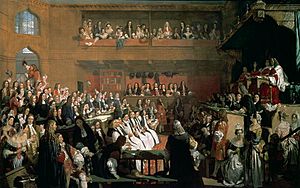Thomas Powys (judge) facts for kids
Sir Thomas Powys (1649 – 4 April 1719) was an important English lawyer, judge, and politician. He was a member of the English and later the British Parliament from 1701 to 1713. He served as the main lawyer for King James II and was involved in a famous court case known as the trial of the Seven Bishops in 1688. Later in his career, he became a judge in a high court, but his time there was short.
Contents
Early Life and Education
Thomas Powys was born in 1649. His father, also named Thomas Powys, was a respected lawyer. Thomas was the second son in his family. His older brother, Sir Littleton Powys, also became a judge.
Thomas went to Shrewsbury School and then studied at Queen's College, Oxford when he was 15 years old. He later joined Lincoln's Inn, which is a place where lawyers are trained, and became a lawyer himself in 1673.
Legal and Political Career
Thomas Powys started his legal career working for the government in different areas of Wales from 1680 to 1686. He was recognized for his work and was made a knight in 1686, which meant he could use "Sir" before his name.
He became a top government lawyer, first as Solicitor General in 1686, and then as Attorney General in 1687. The Attorney General is the chief legal advisor to the government. During this time, he supported the King's decisions, even when they were unpopular.
The Trial of the Seven Bishops
One of the most famous cases Thomas Powys worked on was the trial of the Seven Bishops in June 1688. The King had issued a special order about religious freedom, and the Bishops disagreed with it. They wrote a petition to the King, which was seen as an act of rebellion.
Thomas Powys was the lead lawyer trying to prove the Bishops were guilty. However, the Bishops were found not guilty. This was a big defeat for the King and showed that many people supported the Bishops. Even though Powys was criticized, it was a very difficult case to win because public opinion was strongly on the Bishops' side.
Serving in Parliament
After a big change in government in 1688, Thomas Powys left his government jobs. He then focused on his private law practice, where he became known for being fair, especially when defending people accused of serious crimes.
In 1701, Thomas Powys was elected to Parliament as a Member of Parliament for Ludlow. He was part of the Tory political group, which was one of the main political parties at the time. He was re-elected several times and continued to serve in Parliament until 1713.
In 1702, he was made a "Prime Serjeant," which was another important legal role. He also became a judge for the town of Ludlow in 1707. In 1713, he was appointed a judge in the Queen's Bench, a high court. However, he did not stay in this position for long. He later got his role as King's Serjeant back and held it for the rest of his life. After 1713, he did not run for Parliament again.
Later Life and Family
Thomas Powys lived in Shropshire before he bought a large estate called Lilford Hall in 1711. He passed away in 1719 and was buried at Lilford.
He was married twice and had children from both marriages. One of his great-grandsons, also named Thomas Powys, later became a noble and was given the title Lord Lilford in 1797. A portrait of Sir Thomas Powys can be seen at the Tarlton Law Library in the University of Texas at Austin.
Images for kids
-
Thomas Powys (1649-1719) (Follower of Godfrey Kneller)
 | William M. Jackson |
 | Juan E. Gilbert |
 | Neil deGrasse Tyson |



